

_19_05_0706_0727_dhir. Case Studies. Should Your 2-Year-Old Be Using an iPad. From “Baby Touch: Peekaboo” to “Moo, Baa, La La La!
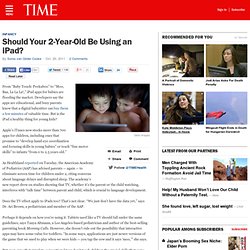
,” iPad apps for babies are flooding the market. Developers say the apps are educational, and busy parents know that a digital babysitter can buy them a few minutes of valuable time. But is the iPad a healthy thing for young kids? Apple’s iTunes now stocks more than 700 apps for children, including ones that promise to “develop hand-eye coordination and focusing skills in young babies” or teach “fine motor skills” to infants “from 0 to 2.5 years old.” As Healthland reported on Tuesday, the American Academy of Pediatrics (AAP) has advised parents — again — to eliminate screen time for children under 2, citing concerns about language delays and disrupted sleep.
Does the TV effect apply to iPads too? Perhaps it depends on how you’re using it. But even apps that simulate conventional toys don’t teach children the crucial skills that come from physically engaging the world in three dimensions, says Dr. An Apple for the teacher: are iPads the future in class? I'm a self-confessed Apple fanatic so I was curious to see how iPads and iPods could be used successfully in a primary school.
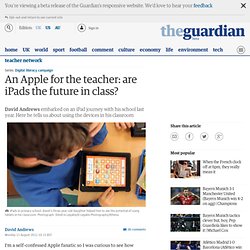
I was sure they would inspire and encourage the teachers I work with to take a chance and think outside their comfort zone and embrace new technology. But before our school jumped on the iPad bandwagon, I wanted to determine how these devices were going to offer a better learning experience compared to the laptops that we already had in our school. My 'iPad journey' began approximately a year ago, when I bought an iPad 2.
I was hooked. My then three-year-old daughter, was also showing an interest. Having seen the huge potential of the iPads as an educational tool, I decided to investigate the pros and cons of iPads compared to laptops in the classroom. In my mind these were the pros: • Ease and speed of use and accessibility: The touch interface and app system on the iPad makes it easy to access learning tools. And here are the cons: iPadANewClassroomTechnology. Fsell2010_031-048.pdf. T4S-Literature-Review-9-4-14. Digital_Play. iPads in Education: A Qualitative Study of Students’ Attitudes and Experiences. World Conference on Educational Multimedia, Hypermedia and Telecommunications, in Denver, Colorado, USA ISBN 978-1-880094-95-2 Publisher: Association for the Advancement of Computing in Education (AACE), Chesapeake, VA Abstract Abstract: The Apple iPad has been one of the most quickly adopted digital technologies in recent history.
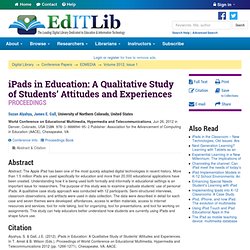
More than 1.5 million iPads are used specifically for education and more than 20,000 educational applications have been created. How much tech can children take? Posted on 18 Nov 2011 at 10:24 Are today's children facing technology overload, or simply gearing themselves up for life in a digital world?
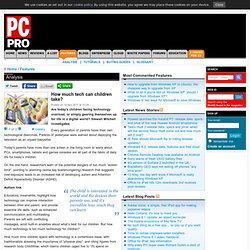
Stewart Mitchell investigates Every generation of parents faces their own technological dilemmas. Parents of yesteryear were warned about deploying the television as an unpaid babysitter. Today’s parents have more than one screen in the living room to worry about: PCs, smartphones, tablets and games consoles are all part of the fabric of daily life for today’s children. On the one hand, researchers warn of the potential dangers of too much “screen time”, pointing to alarming (some say scaremongering) research that suggests over-exposure leads to an increased risk of developing autism and Attention Deficit Hyperactivity Disorder (ADHD). The child is interested in the world and the devices their parents use, and it’s incredible how much they can learn Autism link. Home and away. 12 May 2005 It has long been recognised that while children are competent communicators in their own homes by the age of three, they talk far less when they join an early years setting.
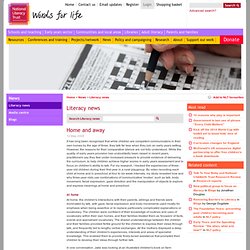
However, the reasons for their comparative silence are not fully understood. While the quality of early years provision has undoubtedly been raised in recent years, practitioners say they feel under increased pressure to provide evidence of delivering the curriculum, to help children achieve higher scores in early years assessment and to focus on children's ability to talk. Generation of iPad children who cannot hold a pencil: Playing with touch-screen devices means youngsters are struggling to learn basic motor skills. BESTOF: Middle-Class Angst over Technology in the Early Years. Study says nursery staff and 'affluent' parents are spurning new technologies in early years.
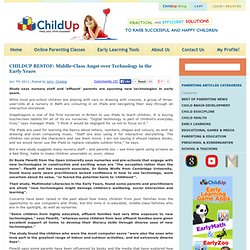
While most pre-school children are playing with cars or drawing with crayons, a group of three-year-olds at a nursery in Bath are colouring in on iPads and navigating their way through an interactive storybook. Snapdragons is one of the first nurseries in Britain to use iPads to teach children. It is buying touchscreen tablets for all of its six nurseries. "Digital technology is part of children's everyday lives," says manager iPads. Are iPads bad for young children? It is hard to find an expert who thinks that monitored and considered tablet use is harmful.
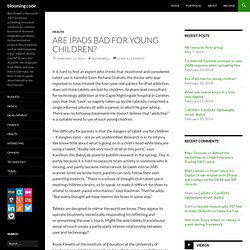
Even Richard Graham, the doctor who was reported to have treated the four-year-old patient for iPad addiction, does not think tablets are bad for children. Graham, lead consultant for technology addiction at the Capio Nightingale hospital in London, says that that “case”, so eagerly taken up by the tabloids, comprised a single informal phone call with a parent, in which he gave advice. There was no followup treatment. He doesn’t believe that “addiction” is a suitable word to use of such young children. The difficulty for parents is that the dangers of tablet use for children – if dangers exist – are as yet unidentified.
Tablets are designed to mirror the world we know. Rosie Flewitt, of the Institute of Education at the University of London, has published research on how iPads can support literacy in nursery, early primary and special education. Rosie Flewitt. Middle-class angst over technology in the early years. Profiles. Every now and then we will feature one of our TACTYC members who will give you information about themselves and why they are members of TACTYC.
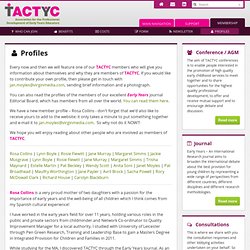
If you would like to contribute your own profile, then please get in touch with jan.moyles@virginmedia.com, sending brief information and a photograph. You can also read the profiles of the members of our excellent Early Years journal Editorial Board, which has members from all over the world. You can read them here. We have a new member profile – Rosa Collins - don’t forget that we’d also like to receive yours to add to the website: it only takes a minute to put something together and e-mail it to jan.moyles@virginmedia.com.
So why not do it NOW?! We hope you will enjoy reading about other people who are involved as members of TACTYC. Rosa Collins | Lynn Boyle | Rosie Flewitt | Jane Murray | Margaret Simms | While studying for the MA, I discovered TACTYC through the Early Years Journal. My name is Sacha Powell. My name is Jane Murray. Are iPads and tablets bad for young children? Four small preschool children are sitting in a semi-circle around their teacher, in a large, bright room in a Georgian house in Bath.
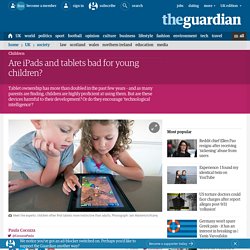
The nursery belongs to the Snapdragons chain, one of the first in the UK to offer iPads to its children soon after the tablet was launched in April 2010. The shelves are full of books, but the children are not looking at books. They are listening to their teacher, Amy Porter, read aloud an interactive story from an iPad about Zub the monster. About the Swinburne BabyLab. The Swinburne BabyLab is a research facility situated in the Brain and Psychological Sciences Research Centre (BPsych) at Swinburne University in Melbourne.
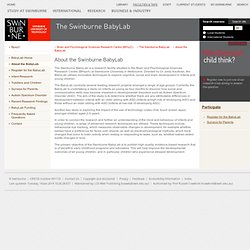
Directed by Dr Jordy Kaufman, the BabyLab utilises innovative techniques to explore cognitive, social and brain development in infants and young children. The BabyLab conducts several leading research projects amongst a range of age groups. Currently, the BabyLab is undertaking a study on infants as young as four months to discover how social and communicative skills may become impaired in developmental disorders such as Autism Spectrum Disorder (ASD). Toddlers & Children (18 months to 6 years) Zero to Eight: Children’s Media Use in America 2013. Girl aged four is Britain’s youngest-known iPad addict. She is so obsessed with playing games on the tablet computer that she is having psychiatric treatment for compulsive behaviour A girl aged four is Britain’s youngest-known iPad addict.
The pre-school child is so obsessed with playing games on the tablet computer that she is having psychiatric treatment for compulsive behaviour. Her parents enrolled her for therapy earlier this year after claiming she was inconsolable whenever it was taken away. The case comes just days after a survey revealed that more than half of parents questioned let their babies use a smartphone or tablet, and one in seven let them use the gadgets for four or more hours every day. Britain’s tiniest iPad addict, from the South East of England, had been hooked on the device from the age of three and was using it for up to four hours a day. iPads in the Classroom. Ncerns raised over impact of tablets on posture. According to Lorna Taylor, director of Jolly Back, modern lifestyles and the increase in technology are having 'detrimental effects' on children's musculoskeletal health.
She has warned that if nurseries, schools and families do not address the problem now, it will have 'far-reaching' effects on children. She said, 'It is vital that we instil healthy habits so children can be comfortable, concentrate, reach their full potential and play and learn, rather than be limited by discomfort, pain and preventable disability.' Her warning comes after a study of 200 school children found that two-thirds of primary pupils experienced back or neck pain over a year. Experts claim that the findings underline a concern among the medical community about the effects of computers, smartphones and tablets on developing bodies.
Advice Ms Taylor, who helped carry out the study, says that nurseries and childminders should encourage children to adopt safer postures while using technology. Research07Oct2013.